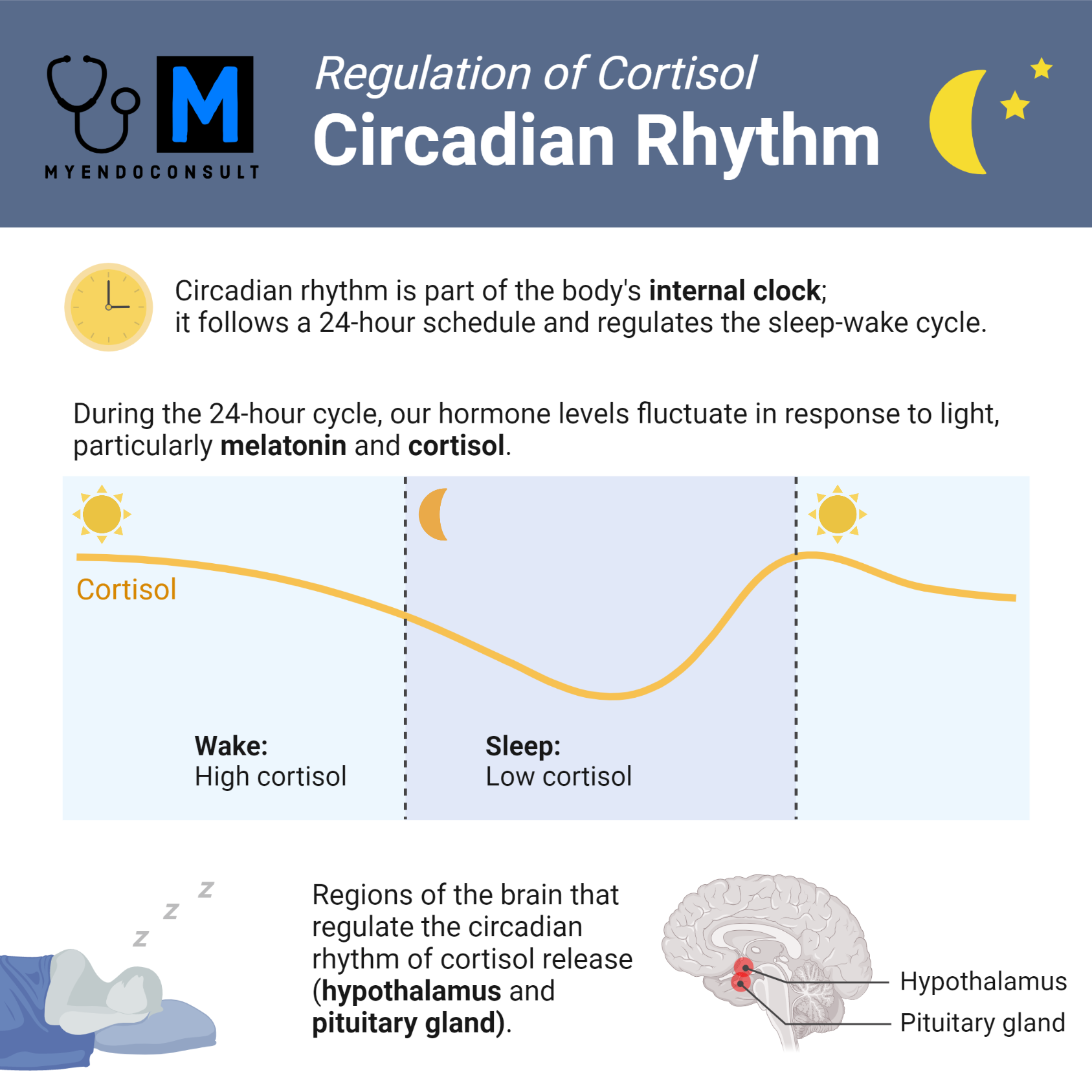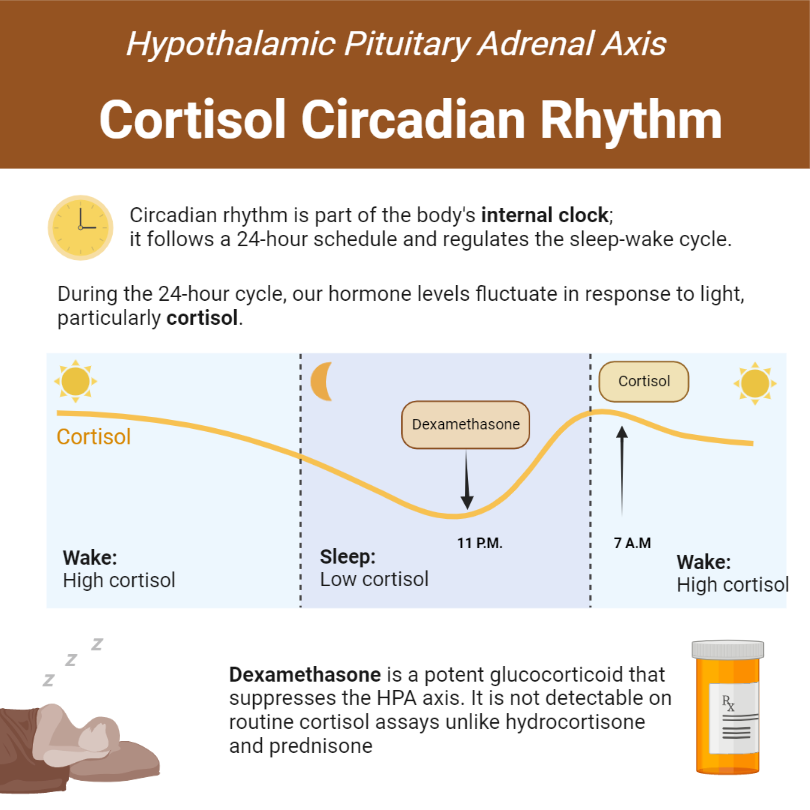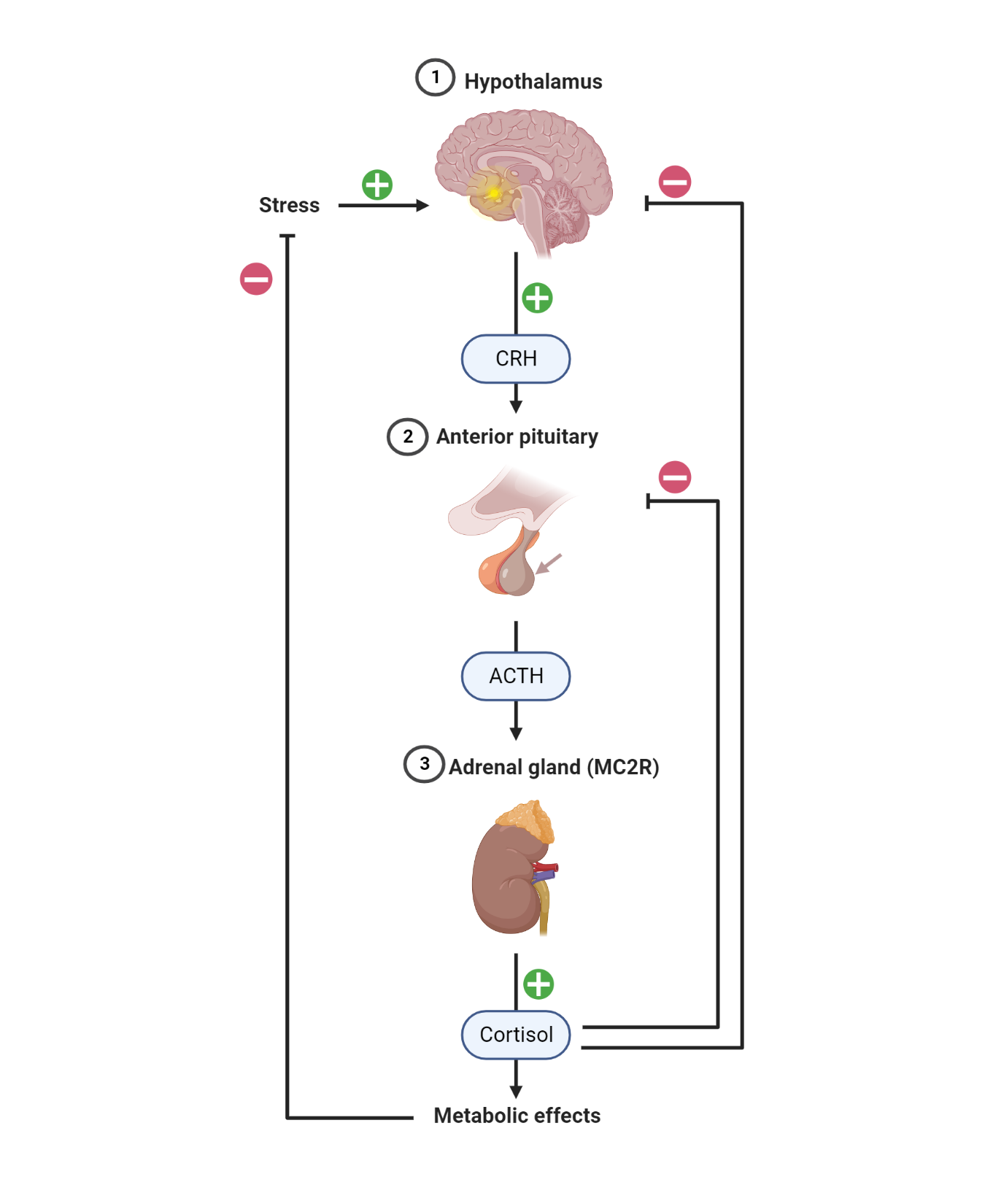Cortisol, a vital glucocorticoid hormone, is released by the adrenal cortex and influences the metabolism of carbohydrates, proteins, and fats. It plays a significant role in modulating glucose serum levels. Indeed, cortisol exhibits a diurnal variation, peaking in the early morning and gradually declining throughout the day. Cortisol testing is crucial for diagnosing conditions such as adrenal insufficiency, Cushing's syndrome, and other adrenal gland disorders. This article delves into various cortisol testing methods, including the dexamethasone suppression test, late-night salivary cortisol, 24-hour urine cortisol, and paired a.m. and p.m. cortisol tests, along with their indications and clinical applications.

Serum Cortisol Testing
The serum cortisol assay measures blood cortisol levels, including free (bioactive) and protein-bound (non-active) forms. This test is conducted on patients suspected of having hyperfunctioning or hypo-functioning adrenal glands. The assessment involves evaluating cortisol levels at different times, typically 8 AM and 4 PM, to capture diurnal variation. Increased cortisol levels may point to Cushing's disease, ectopic ACTH-producing tumors, stress, or hyperthyroidism, while decreased levels could indicate adrenal hyperplasia, Addison's disease, hypopituitarism, or hypothyroidism.
The serum cortisol test can be affected by various factors such as stress, illness, or certain medications. Therefore, healthcare providers should consider these factors when interpreting test results.
Dexamethasone Suppression Test
The dexamethasone suppression test plays a vital role in diagnosing Cushing's syndrome and differentiating its causes. In this test, patients receive dexamethasone, a synthetic glucocorticoid that suppresses cortisol production. Blood samples are collected before and after dexamethasone administration to assess cortisol level responses. A normal response shows a decrease in cortisol levels, whereas an abnormal response is indicative of Cushing's syndrome.

Late-night Salivary Cortisol Test
The late-night salivary cortisol test is a non-invasive method of measuring cortisol levels during the evening when they are typically at their lowest. This test is useful in diagnosing Cushing's syndrome, as elevated late-night salivary cortisol levels can signify abnormal cortisol production. Patients collect saliva samples at home using specialized collection devices and send them to a laboratory for analysis. The late-night salivary cortisol test offers a convenient and reliable option for patients who may have difficulty complying with other testing methods.
24-hour Urine Cortisol Test
The 24-hour urine cortisol test quantifies the total amount of cortisol excreted in urine over a 24-hour period. Patients collect all urine produced during a full day in a provided container. This test is beneficial for diagnosing hyperfunctioning or hypofunctioning adrenal glands, as it captures cortisol levels throughout the day, overcoming serum cortisol testing limitations.
Paired A.M. and P.M. Cortisol Test
The paired a.m. and p.m. cortisol test measures cortisol levels in the morning and evening, accounting for diurnal variation in cortisol production and aiding in diagnosing adrenal gland disorders. Blood samples are collected in the morning (usually 8 AM) and evening (usually 4 PM) to compare cortisol levels at different times of the day. This test provides a more comprehensive view of cortisol fluctuations, enabling healthcare providers to identify abnormal patterns that may indicate an underlying condition.
Serum Cortisol levels
Adults:
- 8 AM to noon: 5-25 mcg/dL (138-690 nmol/L)
- 8 PM to 8 AM: 0-10 mcg/dL (0-276 nmol/L)* (PDR)
Adults/elderly:
- 8 AM: 5-23 mcg/dL (138-635 nmol/L)
- 4 PM: 3-13 mcg/dL (83-359 nmol/L)
Children (1-16 years):
- 8 AM: 3-21 mcg/dL
- 4 PM: 3-10 mcg/dL
Newborns:
- 1-24 mcg/dL
Indications & Uses
- Suspected adrenal insufficiency, such as Addison's Disease, where an unstimulated serum cortisol value < 80 nmol/L (in the absence of corticosteroid-binding globulin deficiency) strongly suggests adrenal insufficiency.
- Suspected Cushing's syndrome, with elevated cortisol levels consistent with a diagnosis. Midnight is the optimal time for obtaining a cortisol level.
Clinical Application
As was previously mentioned, cortisol exhibits diurnal variation, peaking around 6-8 AM, and gradually decreasing throughout the day, reaching its lowest point (nadir) around midnight. Blood collected at 8 AM and 4 PM helps to capture this variation, with the 4 PM value expected to be one-third to two-thirds of the 8 AM value. This serves as a useful screening test for endogenous hypercortisolemia (Cushing's disease)

Cortisol production is regulated by a feedback loop involving the hypothalamus, pituitary, and adrenal glands. The hypothalamus produces corticotropin-releasing hormone (CRH), stimulating adrenocorticotropic hormone (ACTH) production in the anterior pituitary gland. ACTH then prompts the adrenal cortex to produce cortisol. Rising cortisol levels provide negative feedback, inhibiting further CRH and ACTH production.
Increased cortisol levels may indicate Cushing's disease, ectopic ACTH-producing tumors, stress, Cushing's syndrome (adrenal adenoma or carcinoma), hyperthyroidism, or obesity. Decreased levels may suggest adrenal hyperplasia, Addison's disease, hypopituitarism, or hypothyroidism.
Related Tests
Adrenocorticotropic hormone (ACTH) stimulation: Used for the differential diagnosis of Cushing's syndrome or Addison's disease.
Adrenocorticotropic hormone (ACTH): Evaluates anterior pituitary gland function, providing insight into the causes of Cushing's syndrome or Addison's disease.
Dexamethasone suppression: Diagnoses Cushing's syndrome and distinguishes its cause.
Urine cortisol: Assesses patients suspected of having hyperfunctioning or hypofunctioning adrenal glands.
Clinical Scenario-Lab Interactions
Increased cortisol levels may result from depression, hyperthyroidism, hypoglycemia, obesity, pregnancy, or physical/emotional stress. Decreased levels may be due to cirrhosis, hepatitis, or hypothyroidism. Certain medications can also affect cortisol levels.
Conclusion
Cortisol testing is essential for diagnosing and managing adrenal gland disorders such as adrenal insufficiency and Cushing's syndrome.
Kindly Let Us Know If This Was helpful? Thank You!


